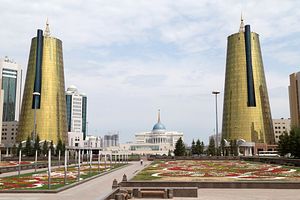On March 20, Kazakhstan will hold snap parliamentary elections. While the OSCE election monitoring mission’s preliminary report notes several systemic problems, comments from the CIS observers mission present a different picture, one without significant flaws. As with previous elections in Kazakhstan and elsewhere in Central Asia, two narratives will predictably emerge. One will cast Kazakhstan as a young democracy: ”Look, elections!” believers will say; and the other narrative will pursue a more critical line. In the election’s mercifully brief campaign, most of the parties are toting the ruling party’s line. Although new energy is promised, the likely outcome will be more of the same faces and more of the same policies.
Originally scheduled for early 2017, the early elections fall into a well-established pattern of preemptive elections. Kazakhstan’s previous parliamentary elections, in 2012, were also held early; as were the last two presidential elections. As I commented in January, “The apparent logic behind the early election is to reaffirm the government’s mandate in the face of extreme economic challenges.” With oil prices at decade lows, a general malaise has settled over the economies of Central Asia and Kazakh President Nursultan Nazarbayev may be trying to head off a political crisis to match the economic one.
Six political parties have registered candidates, though Nazarbayev’s Nur Otan party is expected to sweep the polls. Nur Otan presently holds 83 seats out of 98 in the Mazhilis, and has by far the largest political apparatus in the country. The two other parties that seated deputies in the outgoing parliament–Ak Zhol and the Communist People’s Party of Kazakhstan (KNPK)–have been broadly referred to as pro-presidential. Joanna Lillis, writing for Eurasianet, called two of the new parties–Birlik (Unity) and Auyl (Village) People’s Patriotic Party–“political minnows” and also pro-presidential. The final party–the Social Democratic Party of Kazakhstan (abbreviated as either OSDP or NSDP)–has been branded as the only real opposition party.
For an election billed by the government as crucial to bringing in fresh ideas to tackle Kazakhstan’s many challenges, there’s a serious lack of diversity in opinion between parties. As Lillis puts it “All parties have developed similar campaign platforms, a variation on the theme of fighting the economic crisis while upholding social welfare.”
After the 2012 parliamentary elections, the OSCE mission concluded that while technically well-executed “the necessary conditions for the conduct of genuinely pluralistic elections, which are a prerequisite for functioning democratic institutions, were not provided for by the authorities.”
The OSCE’s preliminary report foreshadows a repeat verdict. The report says “parties’ campaign platforms differ little in tone and substance and have centered around themes of social stability, long-term plans to tackle the economic crisis, as well as the maintenance of national unity and values; all of which are aligned with the President’s long-term strategies.” Nevermind that Nazarbayev’s previous strategies are in part responsible for Kazakhstan’s current state of affairs.
In Kazakhstan, as elsewhere in the region, the technical aspects of democracy–the elections–have been conflated with the actual practice of democracy. That’s not to say the polls are rigged in a traditional sense: Kazakhs will show up and cast their own votes. But the country’s political atmosphere, which embraces a thin sheen of unity over accepting disagreement as a fundamental part of life, holds Kazakhstan back.
As the OSCE report notes, there are harsh penalties (up to 20 years in jail) for the vague crime of inciting “social, national and religious discord.” The law is not just on the books, it’s been used numerous times to punish critical voices. Is it an incitement to discord to say that the present political establishment, which has been in place for 25 years, is out of ideas and that Kazakhstan could benefit from political reform as much as it hopes to benefit from economic reforms?
For elections branded as poised to “new debates and fresh ideas into the public and politics” the OSCE says the campaign has been “low-key.” To be clear, the election is boring because the results are not just predictable but don’t look likely to matter in terms of political discourse.
































